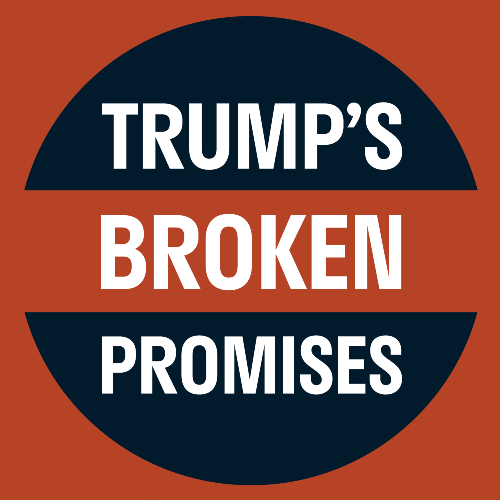
Last year, President Trump asked Native Americans in North Dakota, “I say with respect to the Native Americans … what the hell do you have to lose?”
The answer came into clear focus soon after Trump took office, from his administration’s privatization of tribal lands, to his sabotage of health care access, to his 35-day government shutdown — the longest in American history — which cost tribes like the Chippewa of Michigan’s Upper Peninsula about $100,000 each day.
Below, we outline how Trump administration actions have prioritized politics and corporate special interests at the expense of Native communities.
Share this video on Facebook and Twitter featuring Amber, a woman from the Walker River Paiute Tribe, to highlight how Trump’s broken promises are threatening Native communities.
- The Trump administration’s efforts to repeal the ACA would eliminate the health care 290,000 American Indians and Alaska Natives receive through Medicaid expansion. This would significantly increase the AI/AN uninsured rate, which is already three times that of white Americans.
- Underfunded Indian Health Service hospitals have failed to meet minimum standards for U.S. medical facilities, and AI/AN patients are dying due to inadequate resources and training. In the face of this crisis, the Trump administration has repeatedly proposed further cutting the agency’s funding.
- Trump has disputed the federal government’s historic treaty obligation to provide American Indians and Alaska Natives with health care.
- American Indians and Alaska Natives experience the highest drug overdose death rate of any demographic group and have seen the highest percentage increase in drug overdose deaths. But the Trump administration has dragged its feet to address the community’s unique challenges and has yet to appoint a director to lead the Drug Enforcement Administration.
- In the largest elimination of protected lands in U.S. history, the Trump administration leased millions of acres of native lands to fossil fuel companies in order to finance tax breaks for corporations and the wealthiest Americans.
DEEP DIVE
HEALTH CARE
The federal government is required by treaty to provide health care coverage to the American Indian and Alaska Native people (AI/ANs) in exchange for millions of acres of tribal land. Despite this obligation, the AI/AN community still faces considerable health disparities and unique barriers to care.
While members of this demographic group are three times less likely to have health insurance than white Americans, the Affordable Care Act reduced the AI/AN uninsured rate by nearly a third to 22% in 2016. But the Trump administration’s efforts to eliminate the ACA jeopardize this progress. Full repeal of the law would:
· Effectively end Medicaid expansion, which has provided care to 290,000 AI/ANs;effectively end Medicaid expansion, which has provided care to 290,000 AI/ANs;
· Significantly reduce funding for Indian Health Service, the primary care provider for 2.2 million AI/ANs; and
· Increase out-of-pocket costs for AI/ANs by eliminating subsidies that reduce deductibles and co-payments.
Already, the Indian Health Service is underfunded, with some hospitals failing to meet minimum standards for U.S. medical facilities. Inadequate resources have caused unnecessary deaths and service delays in AI/AN communities, which are often located hours away from other medical providers. In the face of this crisis, the Trump administration has repeatedly proposed cutting the agency’s funding and even disputed the government’s treaty responsibility to provide AI/ANs with health care. And the administration still has not nominated a permanent director to lead the IHS; Trump’s only nominee was withdrawn after it became clear that the administration overstated the nominee’s qualifications.
DRUG EPIDEMIC
American Indians and Alaska Natives have experienced the highest drug overdose death rate and the highest percentage increase in drug overdose deaths. Yet the Trump administration has dragged its feet to address the community’s unique challenges. More than two years into his presidency, Trump still has not appointed anyone to head the Drug Enforcement Administration. Tribes were left out of the federal government’s State Targeted Response to the Opioid Crisis program, which now requires them to go through states to access federal grants to address the opioid crisis.
TRIBAL LANDS
Under the Trump administration, hundreds of thousands of acres of protected tribal lands have been opened to leasing and mineral extraction. For example, the Trump administration eliminated protections from 85% of Bears Ears National Monument in Utah — the largest elimination of protected lands in U.S. history — placing this sacred region at risk for drilling, mining, and looting. Five American Indian tribes sued the federal government over this legally dubious decision, calling it a “tremendous affront to tribal sovereignty”.
In the Arctic National Wildlife Refuge, where the Gwich’in people have relied on the health of its land and wildlife for generations, the Trump administration is moving forward with controversial plans to open the area to drilling, with a lease sale possible as early as December 2019. Oil and gas drilling would irreparably harm the Porcupine caribou herd which calve on the coastal plain of the Arctic Refuge, a tribal food staple that is sacred to the Gwich’in. In a clear prioritization of corporate special interests over tribal sovereignty, the sale of oil leases in the Arctic Refuge was incorporated into President Trump’s tax bill in order to finance tax cuts for corporations and the wealthiest Americans.